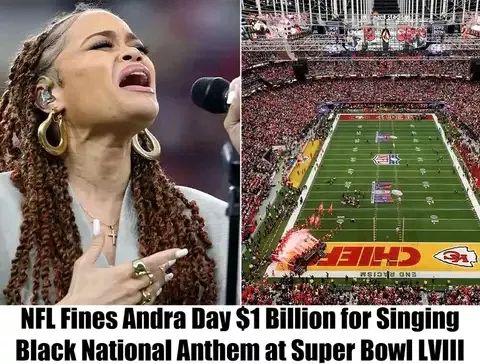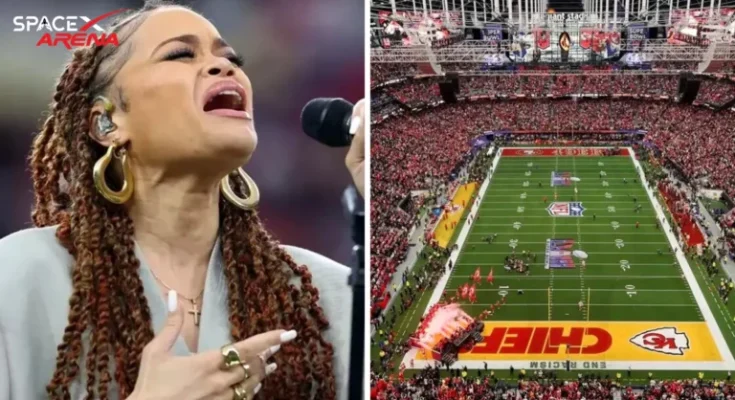The National Football League (NFL) has imposed an unprecedented $1 billion fine on the celebrated singer Andra Day for her singing of Black National Anthem, “Lift Every Voice and Sing,” during Super Bowl LVIII. That has sent a shockwaves through the worlds of sports, music, and societal discourse, This moment move has sparked intense debate, leading to critical discussions on cultural expression, the role of sports in society, and the boundaries of free speech.
Andra Day, known for her soulful voice and artistic depth, took the stage at Super Bowl LVIII, a global platform viewed by millions. Her performance of “Lift Every Voice and Sing,” intended to celebrate unity and diversity, was moving and impactful, echoing with historical significance and the ongoing fight for racial equality.
The aftermath, however, has been anything but harmonious. The NFL’s decision to levy a staggering $1 billion fine represents an unmatched moment in the league’s history and has kindled a nationwide conversation about the intersection of sports, politics, and cultural identity.
The reasoning behind the fine is as intricate as it is contentious. The NFL has traditionally emphasized non-political, universally appealing content for Super Bowl performances. Still, this hefty fine indicates a firm stance against what the league views as a deviation from its established norms.
Critics argue that the fine extends beyond rule enforcement, illuminating deeper issues within the NFL’s approach to social and racial issues. They highlight the league’s troubled history with racial equality, including the treatment of protesting players and the lack of diversity in leadership and teams.
To fully understand the impact of Day’s performance and the ensuing controversy, one must comprehend the cultural and historical significance of “Lift Every Voice and Sing,” often referred to as the Black National Anthem. Its inclusion in Super Bowl LVIII was seen as a step towards acknowledging the diverse tapestry of American culture and the ongoing struggle for racial equality. The decision to fine Day for singing this anthem resonates beyond sports, touching on broader societal issues and the ongoing debate over America’s racial past and present. It raises crucial questions about who determines acceptable expressions of cultural identity, particularly in influential and widely viewed spaces like the Super Bowl.
The decision to fine Day for singing this anthem resonates beyond sports, touching on broader societal issues and the ongoing debate over America’s racial past and present. It raises crucial questions about who determines acceptable expressions of cultural identity, particularly in influential and widely viewed spaces like the Super Bowl.
 and Banned her from….Read More
and Banned her from….Read More 


